Leigh Patrick Sullivan, The Truth About "Atheist Tolerance" and Other Self-Delusion

I spend a significant portion of my time debating and exchanging views with fellow primates on Twitter. I make a rule of never being abusive, hostile or assuming to know what someone else believes. I frequently pose my responses as questions, in order to avoid being presumptuous. I also never tell anyone they haven’t the right to believe what they want to believe, as this would clearly be wrong. I think the most I am guilty of is sarcasm, mockery and ridicule. I’m perfectly comfortable with this. I make sure I deal with the actual statements put forward, whether they are made to me specifically or to the “Twitterverse” in general. I aim to do this as calmly as possible and in a civil manner, often pointing out logical fallacies, or citing sources to address failures to understand established scientific concepts or terminology. I’ve sent more than 11,000 tweets, and when I receive responses they often take the form of glaring ignorance, foul language/abuse/hostility/threats. I have never responded in kind. I simply don’t need to. Once someone decides to engage in that way, they lose any and all credibility, and I chalk it off as a victory. #AnotherSatisfiedCustomer. It is confusing to me that religion appears to be the only domain of discourse where the mildest form of criticism at its expense is labelled as “intolerant” or “aggressive”. This is especially concerning given the influence religion exudes on society as a whole. There seems to be a growing trend, born out of desperation, to label any criticism of religion, however mild as “aggressive atheism”, or “militant atheism”, often atheism is interchanged with secularism to the same extent, but the same fallacy remains. Religion has done an impressive job in modern society of claiming itself exempt from challenge and criticism. There seems to be a consensus within religious circles (and irreligious) that disagreement is all that is needed to constitute intolerance. The mantra “You should always respect people’s beliefs” is directed my way frequently when questioning people’s religious statements. I disagree with this rule on almost every level possible. It is a useful rule of thumb for children within the classroom to instil a rudimentary understanding of the concept of respect; however it is severely inadequate when applied to adult life and the complex adult world we live in. It soon becomes obvious, glancing at the diverse beliefs held on our planet such as misogyny, racism, conspiracy theory, creationism, Voodoo, Faith healers, Justin Bieber’s talent, to name a tiny fraction, that they are not all worthy of our respect and consideration. It is far more reasonable to suggest: You may believe whatever you choose, that is your right. You may not however, demand others respect those beliefs by default. Claiming you have a right to your opinions and beliefs is one thing. Claiming a right to have them listened to, respected and accepted without criticism is fascism. Your right to respond is vital. It is (unjustly) almost universally accepted that criticism of religious beliefs is off-limits, and often even considered “impolite” or “taboo”. This is a dangerous concession of your rights. If you are not free to criticise religion, you do not have any measure of free speech at all. This is because the claims of the Godly pertain to the ultimate and most important questions imaginable, from cosmology, to morality, death, life, science, philosophy and nature. If you are not free to have an opinion on these matters, or openly disagree with those that do, you do not really possess any rights to free speech at all. This would be to allow religion the monopoly on these ideas, and would place a theocratic roof over our heads, preventing us from further advancement in our understanding and discussing the ultimate questions. This brings me to a recent Twitter exchange with Leigh Patrick Sullivan @LeighPatrick. Since the individual is comfortable with promoting their Twitter and blog in their own name, I can’t see how it would be unreasonable to display it here. After an evening of interaction on twitter, the user “authored” a blog post the next morning entitled "Atheist 'Tolerance' Revealed'. The inference is that the entire exchange was an intentional instigation in order to gauge the attitudes of “progs” or atheists towards Christians in “modern Society”. Or as they maturely put it to me, “you’ve been played babycakes” I don’t buy this at all. It seems like a thinly veiled attempt to justify being thoroughly out debated, post-debate. Or saving face as it is commonly known. “ha! It was part of my plan all along!”. This dishonesty allows them to frame the criticism they received as expected, and unreasonable, without accounting for what was said, and what accusations were made. If I were to purposely invoke reaction as part of a “social experiment”, and in the course of doing so, intentionally assume the role of an obnoxious ignoramus, I would be sure to document my intentions beforehand, to counter any claims of dishonesty. It’s telling to see this wasn’t done. Odd considering it was part of a “plan”. Even if I accept this is the case for the sake of argument, which I am happy to do, I still disagree with its premise, and accusations/conclusions made during the course of discussion. I can’t account for every atheist they exchanged tweets with, and whether or not they remained reasonable (I’m sure many didn’t), but since the charge of intolerance and intent to stifle the right to believe were levelled at me personally, even in light of my consistent civil demeanour, I feel the need to share and refute the claims for the flights of fancy/lies that they are. The original tweet that caught my attention is as below. Any statements in "quotations" will be those made to me or others. Any statements not in quotations or preceded by a "+" will be my own:
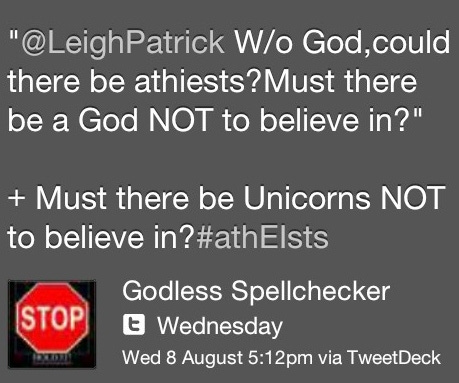
This catastrophic failure of logic, was to suggest there must be a God, in order for atheists not to believe in him. I provided a suitable comparison in order to highlight the failings of the comment, and was kind enough to supply the correct spelling of "atheists". You will notice at this point, I am in no way assuming the beliefs of the tweeter, nor telling them they have to believe anything. We are firmly in the realms of discussing logic. It soon becomes clear hereafter, that the conversation we are actually having, and the conversation they assume we are having are very different. Many attempts are made to detract from the points at hand, in order to accuse me of intolerance, or “attacking”. I’ll leave you to judge whether I appear intolerant, or whether I attack/assume any personal beliefs, or claim they have no right to hold them.
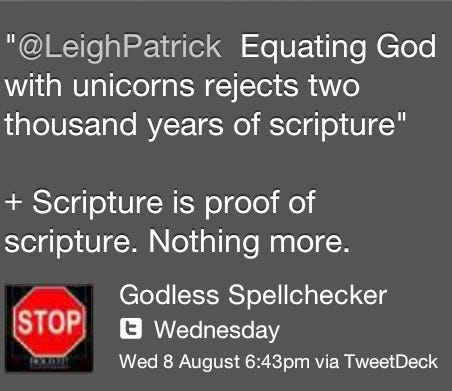
The response to my Unicorn comparison, was to suggest scripture makes the claim of God more credible. This is the first moment any religious statements are made (e.g scripture), and are not made by myself. As is obvious, scripture is the "claim" and not the proof of anything. My comment makes this point. One of my followers then posed the question that If they were to write a whole book claiming the existence of Unicorns, and allow for 2,000 years to pass, would this now mean Unicorns exist? Another sound and logical question to which:

My comments, need little explanation. I doubt there is anything controversial here. It is a well documented historical fact that religion was enforced in the most heinous ways possible. There was a time when there was simply no other choice but to be a person of God.
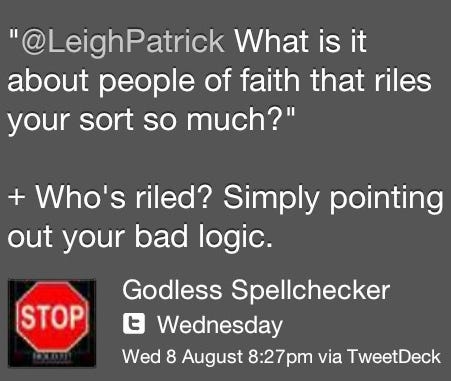
So, at this point I have only made some logical and historical statements in a direct, yet civil manner. I haven't made any comments/assumptions about people of faith, or attacked anyone personally. I'm then accused of being "riled" by people of faith, and referred to as "your sort". I'm not sure what assumptions are being made here, or what my "sort" constitutes, but it doesn't at all seem positive and taps the boundary of prejudiced generalisations. I don't rise to the bait, I explain I am not riled in the slightest and simply reiterate my intentions were to highlight bad logic.

When I dare to suggest the Bible is bronze age myth, authored by semi-literate desert dwellers, I am instantly accused of intolerance. As if to say, because belief is concerned, I have to ignore the historical facts regarding the origin of scripture, and accept its claims. What else shall we pretend isn't true in order to avoid contradicting beliefs? Is this a mature mentality to adopt to questions of this nature? It appears any reasonable, factual statements to the contrary of religious beliefs, are instantly intolerant. Am I to pretend something isn't what it is because beliefs are involved?
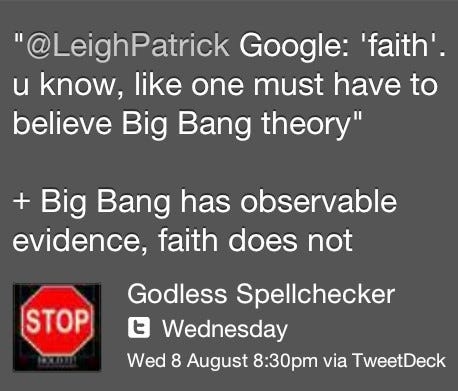
Now, notice when an attempt is made to discredit something I hold to be true, i.e "The Big Bang", I don't claim intolerance, or result to asking "why your sort" has such an undeveloped scientific education. Of course, as we know, The Big Bang is not a faith-based position, but a scientific fact supported by an abundance of observable evidence.
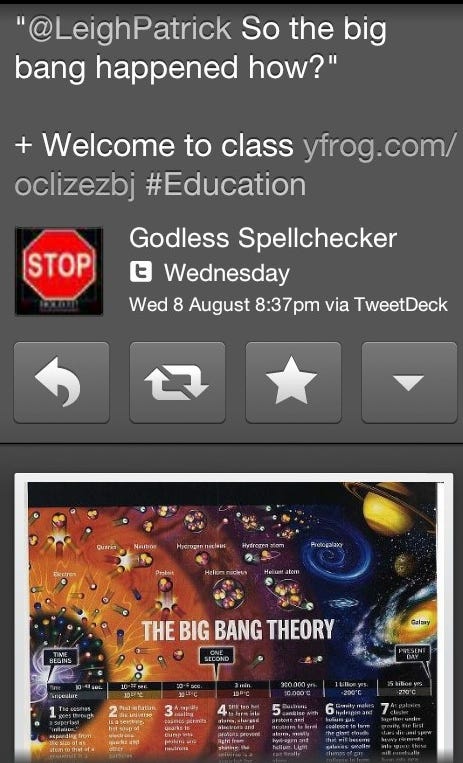
As we can now see, it is now my responsibility to educate an adult on the nature of the cosmos. I provide the above image, detailing what we know about The Big Bang, and how we know it.
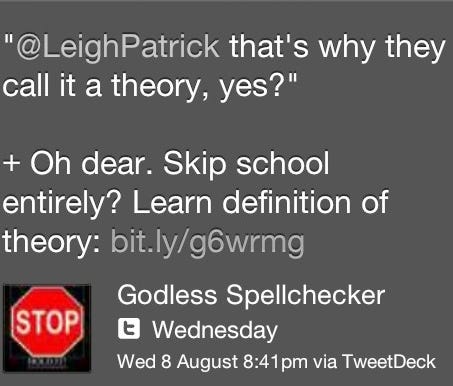
As is common among people with low scientific understanding, facts are often dismissed as "just a theory". "Scientific theory" does not mean "guess" as sometimes used in the common vernacular. I provide this link, which details the correct meaning of the word "theory" in the scientific context, and how theory is the highest status any scientific observation can attain, eg. Gravity, germ theory etc.
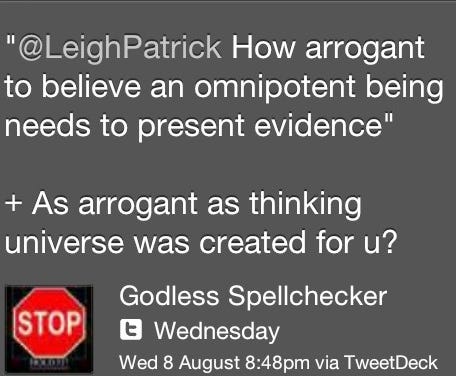
So, now we have not only an assertion that there is an omnipotent being, but accusations of arrogance for simply asking for evidence. Asking for a claim to be supported is textbook "reason". I point out it takes significantly more arrogance to assume the entire Universe was "created" with you in mind.
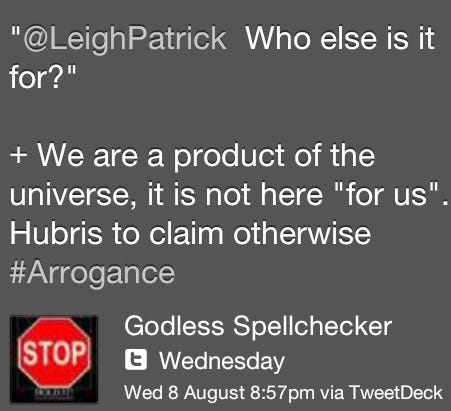
Another assertion is made in the form of a question. If the universe isn't here "for" us, who else is it for? We know the sum of our parts, and the earth is a product of our Universe. There is no indication, observable or otherwise to suggest any of this had us in mind. Large portions of our planet cannot support life, and eventually the sun will boil our oceans and obliterate us. Some design.
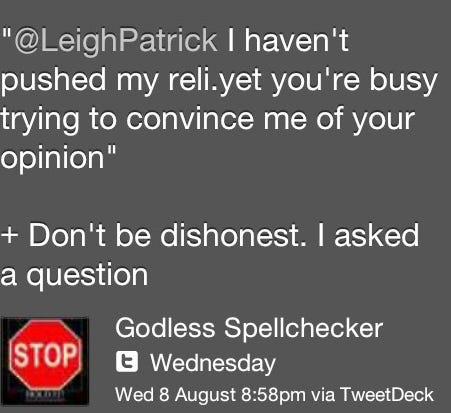
So, now it appears asking questions in regards to claims made, and putting forward established scientific fact in a calm manner is pushing my opinions. Turning the attention to me personally is a blatant defensive reaction in the face of contradictory, hard cold fact.
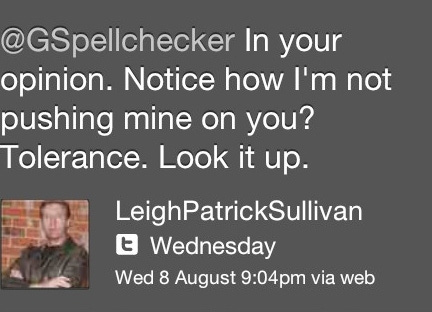
When ignorant claims are made (The big bang requires faith!) instead of acknowledging this failure of understanding, efforts are made to employ “loaded question fallacies” concerning “intolerance” or “the right to believe”. I'm not pushing my opinion. As I will continue to reiterate, I am disagreeing with statements made. Do I not have the right to do this?
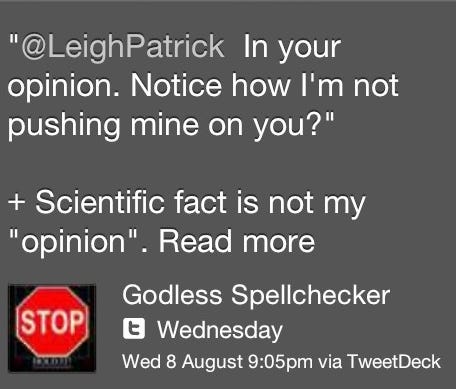
I make the point It is not "my" opinion I'm stating, but scientific fact that can be found in the books of any high school in the developed world. Again, defensive avoidance is used to turn the attention to me, instead of the facts at hand. I keep on topic, and do not rise to the bait.
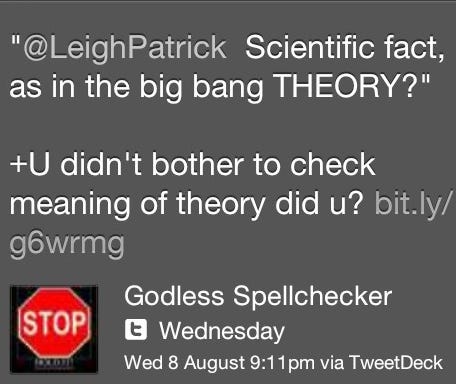
And we appear to be going in circles. In an undeniable display of wilfull ignorance, no attention was paid to my attempts to educate on the meaning of the word "theory". Again, something I hold to be true is belittled. I make no claim of intolerance, or attempt to ask why he is pushing his opinion regarding The Big Bang Theory. I provide the link to the correct definitions once more.
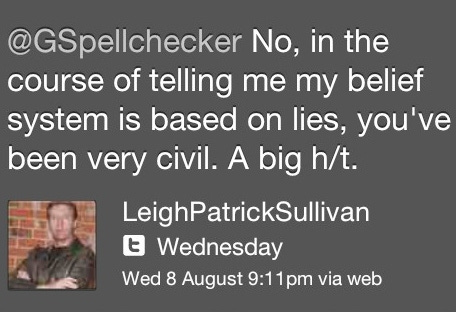
More defensive efforts to avoid the issues at hand. I've never mentioned a belief system, assumed to know what his particular one is, or told him it is based on lies. I've made generic factual statements about scripture and the nature of the cosmos. Again, am I obliged to pretend these things are not true, because someone "believes" otherwise?
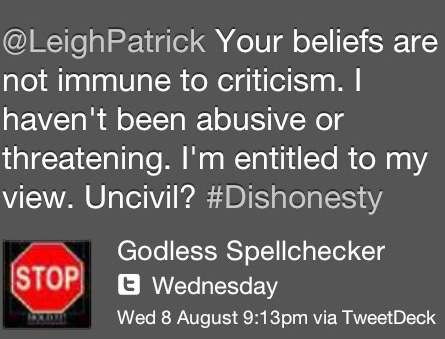
I calmly make a reasonable point, and make the charge of dishonesty in their accusations.

A fellow atheist and twitter comrade makes a valid, if not amusingly flippant point about scripture. This is instantly dismissed solely due to him being Scottish. Racial intolerance and stereotyping? I believe so.
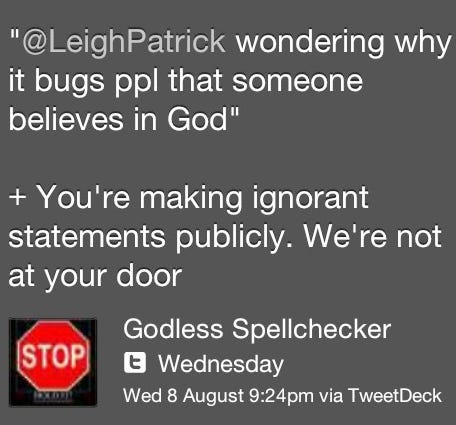
More defensive accusations. I've never claimed to be bugged by anyone who believes in god, I have thus far dealt with the poor logic, scientific claims and statements made. I reiterate that he is conversing on a public forum, and therefore inviting comment.
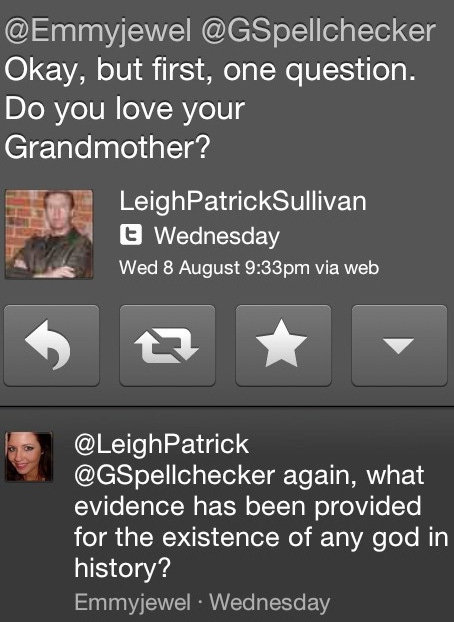
Another Twitter comrade, reasonably requests evidence for the existence of any God, based on a previous claim made. The question is deflected, by what I consider, an inappropriate personal question. I think we can already see where this is heading..

Despite the personal and inappropriate question, it is answered politely. It is confirmed that they indeed did love a grand parent. They are then swiftly told to "Prove It". The arrogant assumption being, because a creator is unseen, and so, seemingly is emotion, it is a valid comparison. Nonsense.
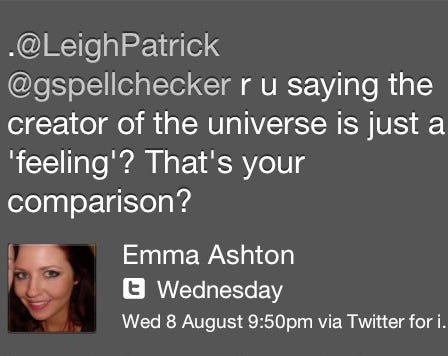
Thankfully, especially given the delicate nature of the question, it is seen for what it is.
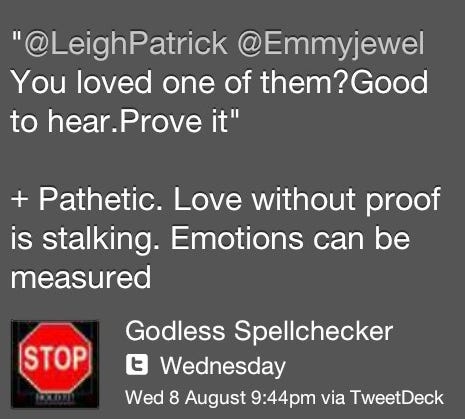
I point out the observable nature of emotional feelings, and my distaste of the appeal to emotion tactics.
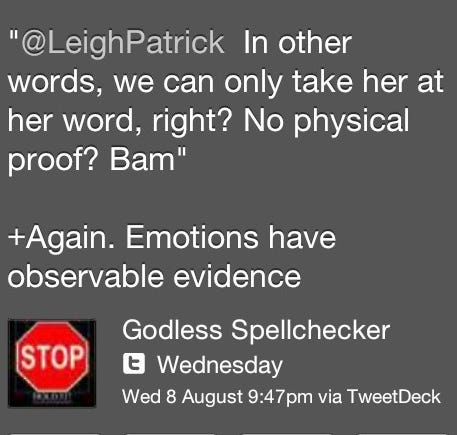
A grown man actually finished a point with "Bam"

Another Twitter comrade smartly elaborates on the observable nature of emotions, demonstrating how it is not comparable to that of a creator.
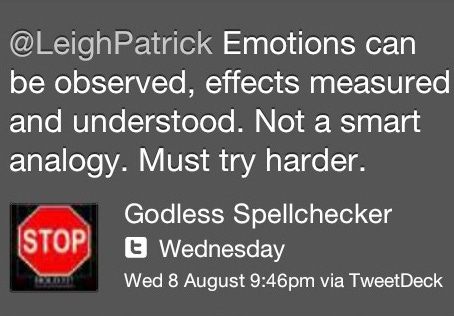
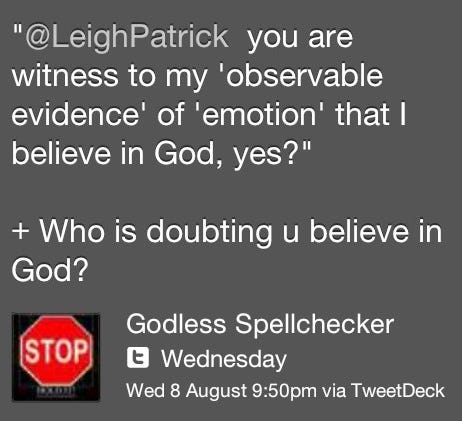
Another, unintentionally humourous failure of logic is postulated. Basic logic will tell you, evidence of emotion is, evidence of emotion. Not evidence of an omnipotent superman. I make the below observation regarding Santa. Point made.
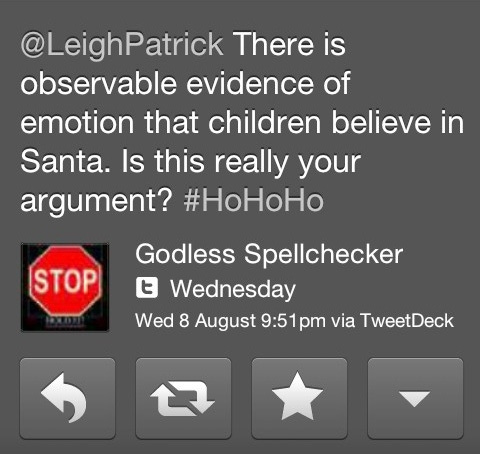
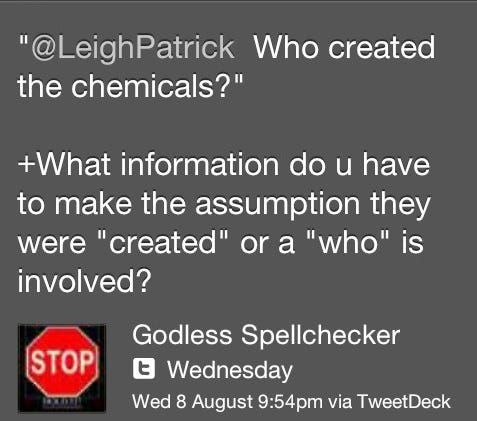
This question is asked when It is explained emotions can be understood and explained from a chemical level. The assumption of a "who" is made.
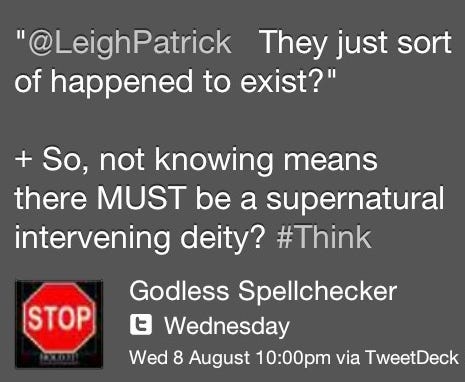
Another fallacy, common amongst the majority of theist I converse with. It is not logical to assume in the absence of a real explanation, that a supernatural one is reasonable, or by any way the default position, for obvious reasons. "we don't know x, therefore God" is an assumption, and an unsupported one at that.
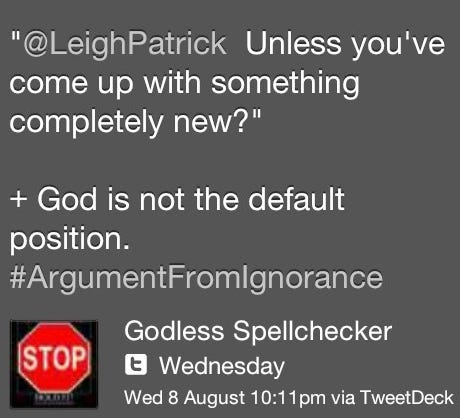
An argument from ignorance is made. The assumption being, that If I am not able to explain the origin of something, then God is the winning explanation by default. It is worth noting, that any question, ever answered, in the history of the Universe, ever has turned out... not to be God.
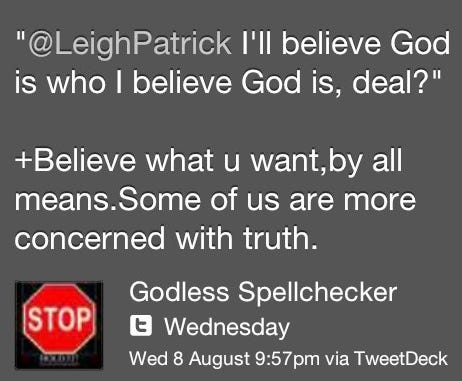
I doubt this could be much clearer in stating I have no issues with people believing what they choose. But If i don't think it is true, I likewise have the right to say so.
This appeared to conclude our exchange. For The Evening. On to the following evenings fun..
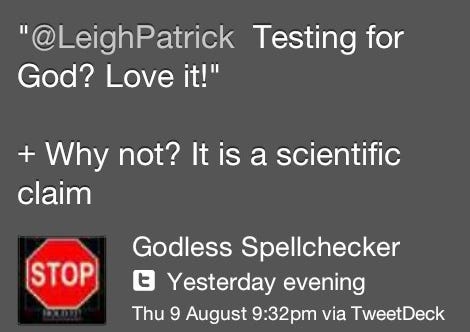
As we arrive at the following evening (don't worry, we're nearly there!), a response is made to a claim that God has failed every scientific test imaginable for the claims of theist. This is scoffed at, obviously. This is odd. The Godly like to position their chosen deity outside the realms of science. They attempt this without realising the existence of a creator is a scientific claim. The claim is not subjective. There either is a creator, or there isn't, and there is either evidence for one, or there isn't. Also, as soon as you begin to add the further claims of scripture, this falls firmly into the realm of the testable. The age of the earth, the origin of species, the power of prayer, miracles etc can all be discredited by the scientific method. The best measure we have of knowing anything.
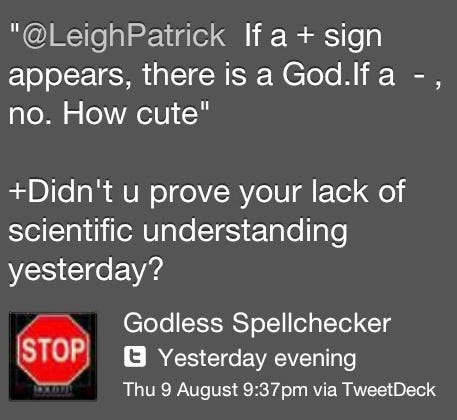
I flippantly point out the failure to grasp basic science the previous evening.
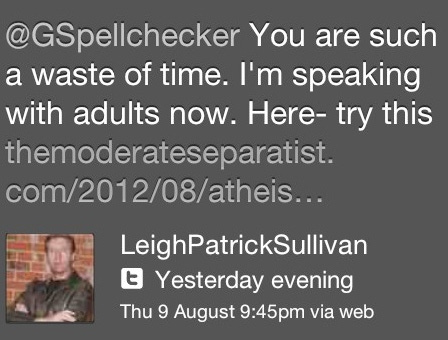
I am accused of being a waste of time (a little harsh) and the blog post in question is revealed! It was all part of his master plan from the start! #Dubious
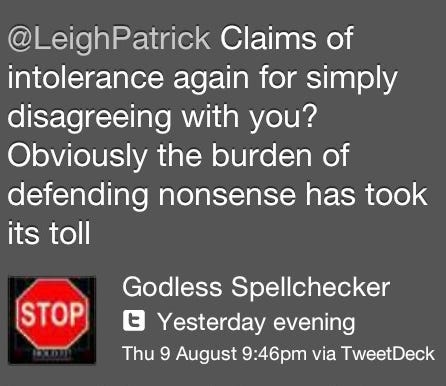
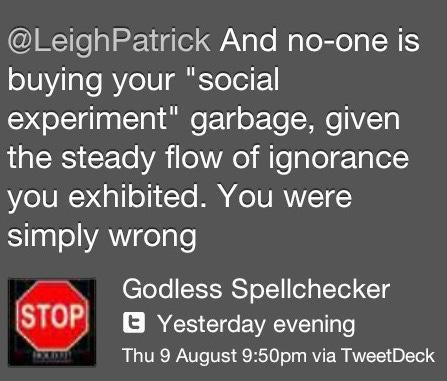
I again, point out the undeserved claims of intolerance, and assert my doubt regarding his claims of a "social experiment".
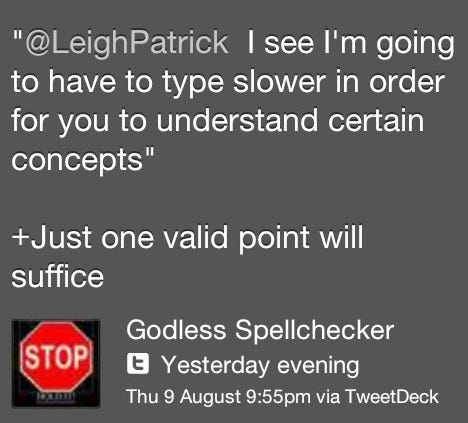
Man-child mode initiated.
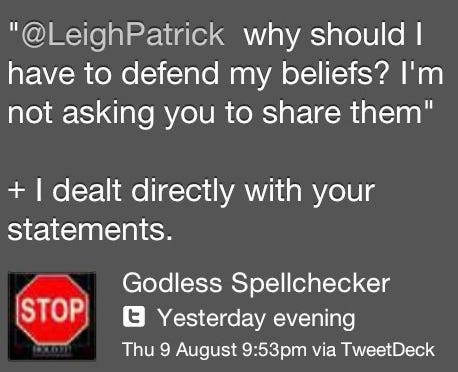
Another claim that I am attacking beliefs. I reiterate I dealt only with the statements made. Even at this point, I am still in the dark as to their personal beliefs.
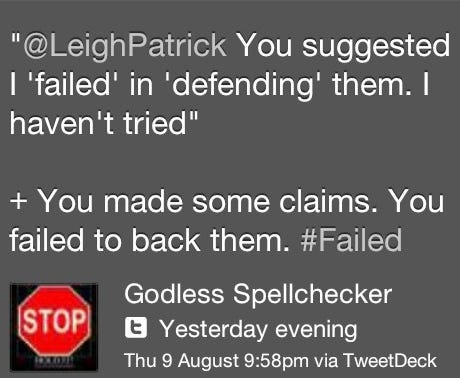
I again make it clear, it is the claims/statements I have dealt with, and nothing more.
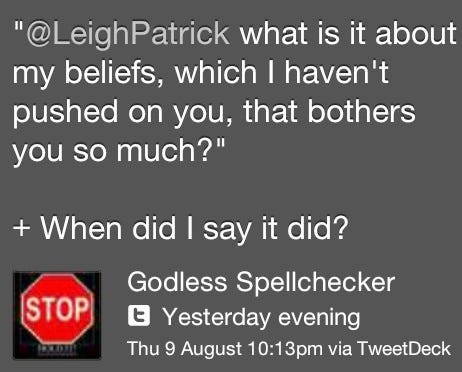
More accusations. I reiterate I haven't even addressed beliefs, nor have I demonstrated an inch of bother.
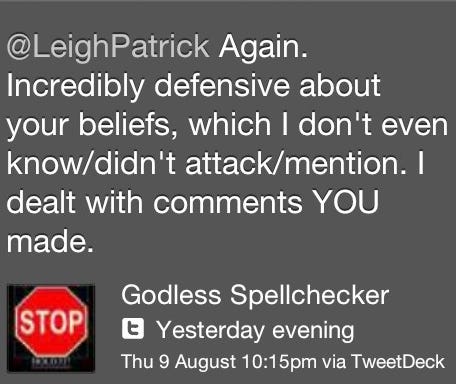
I doubt I could make the above any clearer.
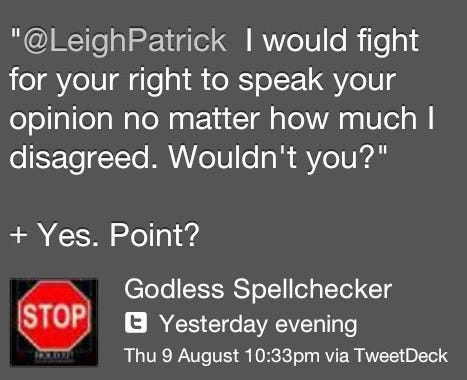
Another loaded question fallacy regarding free speech, rather than any of the subjects we have conversed about. More deflection tactics.
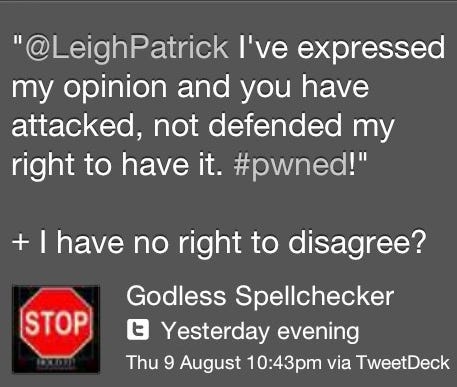
Now, this is truly incredible, and not because a grown man exclaimed "pwned!". There appears to be a complete failure to grasp the difference between having a right to your opinion, and claiming the right it should be immune to criticism. This is all but stating I have no business disagreeing with what they say. Now THAT would be suppression of free speech.
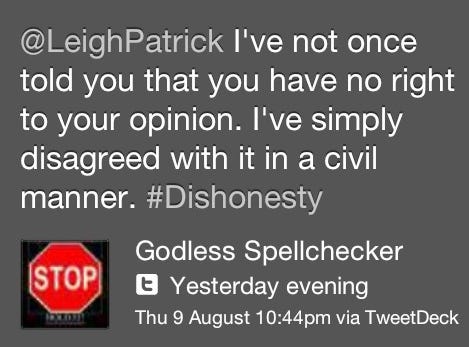
I explain myself. Reasonably. Again.
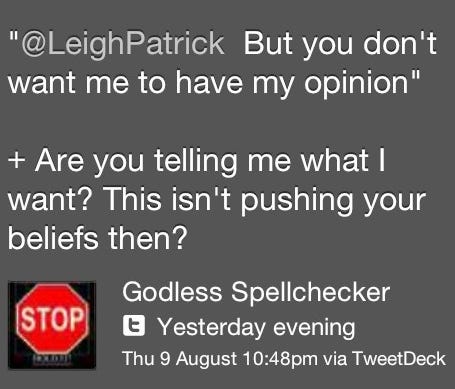
It appears, I am now in fact being told what I believe. The irony.
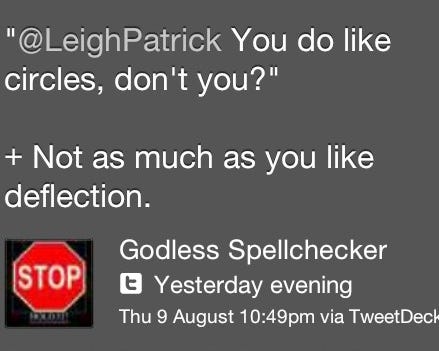
We end on the above. In short, it appears disagreement is falsely portrayed as intolerance, in order to avoid being held accountable for statements that are demonstrably untrue, or cannot be supported. The individual claims in their blog they were reasonable, and were essentially set upon by intolerant atheists. I believe I have demonstrated how this self-delusion is a result of being unable to intelligently support their statements. Not at any point did I suggest they should change their beliefs and join the dark side. It’s important to note, this entire exchange was a result of publicly made claims/statements. Twitter does not exist solely in your lounge, on your laptop, or in your palm courtesy of your smart phone. Nor, unless the necessary privacy settings are tweaked, are your comments exclusive to your followers. It is a social network and globally connected public forum. Anything you tweet is an open invitation to everyone who has access to the internet, to view and respond to your comments if they wish, for better or for worse. Claiming intolerance when people disagree with your comments on a global public forum, is nonsensical and holds zero weight as an intelligent argument. You should think of a tweet as similar to scrawling your opinion on a T-shirt in clear and large letters, then going about your daily routine with it on. Except, your tweet isn’t a garment you can simply remove, it is digital and its fingerprint remains, to be shared amongst an unfathomable number of people, that you would not even be able to fit in the space that accommodates your daily routine. Turning up to someones place of work, residence, or even phoning them to berate them for their beliefs, without any instigation would be intolerant. @LeighPatrick tweeted regarding atheists. People responded. There is no surprise here. Twitter actually does NOT work in mysterious ways. I fail to see how a claim can be made that this is a representation of attitudes towards Christians in modern society. Even if there is an inch of truth in the “Social Experiment” claim, and an inference that this wilful ignorance could be attributed to an “act” for purposes of research, this still falls firmly in the territory of Poe’s Law. None of any of this infringes on your rights to believe what you want, or to hold any opinion you may have. Nor is it representative of “Modern society” and its “attitudes towards Christians”, as the ego stroking blog piece claims. Twitter is a public forum, debate will be had, nonsense will be called out, ignorance will fly, such is the internet. There is an alarming number of instances of late where “Christian persecution” is claimed, often simply for being denied certain privileges no other group on the planet demands: assuming your beliefs are exempt from criticism. Shouting “intolerance” whenever direct claims/statements you have made, especially publicly, are challenged is nothing short of disingenuous, and you won’t get away with it. GS
